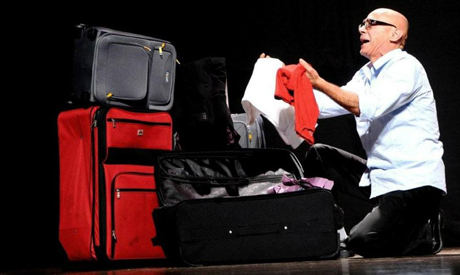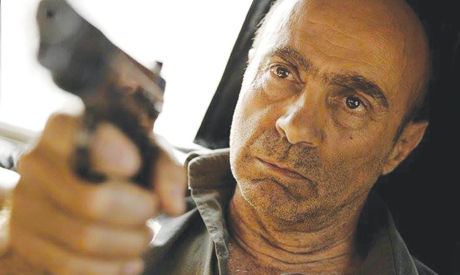Coming soon this year is the premiere of the HBO film Oslo, adapted from a Tony Award-winning play of the same name. The film is based on a true story from the 1990s. It follows the secret back-channel talks that led to the 1993 Oslo Peace Accords.
Directed by Bartlett Sher and written by J.T. Rogers, Oslo has on its cast the Palestinian actor Salim Dau (b. 1951) who plays the role of former Prime Minister of the Palestinian National Authority Ahmed Qurie (b. 1938), one of three PLO leaders who met secretly with Israelis in Norway to hammer out the Oslo accords which paved the way to the first interim peace deal between the two sides in 1993.
Despite a long career in cinema, television, and theater (over 60 works), Salim Dau wasn’t introduced to the Egyptian audience until recently with his remarkable role in Gaza mon amour (2020) by the Palestinian directors Tarzan & Arab Nasser. The film had its Middle East premiere at the International Competition of the 42nd Cairo International Film Festival (CIFF) where it received a special mention and the special jury Best Arab Film Award.
The film also received positive feedback from both the critics and the Egyptian audience, with much praise for the role of Issa, the fisherman played by Salim Dau. But he was not able to join the film crew in Cairo because he was busy shooting the HBO film Oslo.

Sagh Salim
Speaking of his role in Oslo, Dau believes that it was one of those roles where politics could be a confusing factor. “I play the role of Qurie in 1993, when the consequences of Oslo were not yet known and when there was a lot of hope and positivity,” he explains.
“Although I know what really happened in reality 27 years later, as an actor I should put all my thoughts and feelings in the 1990s to be able to expressively introduce the character as it is written in the script.”
The main reason he took part in such an important work is the way the role of Qurie is written: “I loved the script so much. It is totally different from my role in Gaza mon amour. It is full of dialogue, where the other role was more about body language. It is also written in English and I am more fluent in French. But it is worth it, especially with the great harmony among the crew which is as important to me as the role itself”.

L’Infiltré
Born in the village of Bi’ina in Galilee, Dau finds that the roles closest to his heart are those that connect with his roots.
“In every role I play no matter what there is definitely something of this kid who was born to a farmers’ family in the village of Bi’ina. But you see when it comes to roles like Issa in Gaza mon amour, Qurie in Oslo, Abu Raji in Curfew [1994] or Hammoudi in Swallows don’t die in Jerusalem [1994] etc., these characters are part of my life even if they are not close to my real character. Bi’ina is the well out of which all my career springs.”
Dau recalls those days when, at a very young age, his father’s friends – gathering to rest after a tiring day in the fields – would ask him to mimic this person or that. “I was an expert even at five, and the funny thing was that they used to reward me with fruits, sweets, and a little money. So being an actor was the thing for me at a very early stage in my life. And all the characters I witnessed there have been coming along with me wherever I go”.
Dau spent six years as the youngest child in the family, before his younger brother was born. “During these early years I was spoiled by my parents, by the women of the family, and even the women of the village as I was born after another brother who passed away in his fifth year. These memories, the cultural and folkloric fortune I inherited planted inside me everything I have now including the will to love, tolerance, and unequivocal freedom and justice.”
It influenced his acting style and method. “It is true that the script is a main point but how I see the character while I am reading the script is the thing,” he explains. Dau can only accept a role when the character motivates his body to move and to talk and to walk like the character.
"I do not think with my mind, but with my body. In the first reading of Issa’s role in Gaza mon amour I immediately saw him carelessly walking and smoking with a sarcastic smile on his lips. That is why even before knowing what exactly I was going to do I called the Nasser brothers to tell them I was in.” One of the distinguished features of Dau’s acting way is the flexibility and suppleness of his body which enables him to adapt to different characters’ body language.
“This was clear in Gaza mon amour where with very few words the character was represented through body language,” he agrees, saying that he inherited that flexibility from his father but added to it the experience of his study. In 1972 after secondary school Dau began studying acting at the School of Performing Arts of Beit Zvi, before receiving a scholarship to continue his studies at Jacques Lacock ‘s acting school in France which is one of the world most prestigious institutes for the arts of movement, mime and comedy; he graduated at 1979.
In addition to his long career as a film and TV actor, Dau has a steady relationship with theatre. During the eight years of his stay in France his work as an actor diversified, from telling stories with a troupe of narrators, to working with famous theaters in Paris, including the prestigious l’Atelier de theatre. He also taught acting in France between 1980 and 1984. He works as a playwright, theatre director, and actor in addition to his position as the director of the Karma Theatre in Haifa, which is a prestigious hub for acting training and practice.
One of Dau’s distinguished theatrical works is Sagh Salim, a musical monodrama written, directed and performed by him, which tells the Palestinian epic through a biographical story. The play was performed in many theatres in the Arab world and in Europe, the USA, and Australia. “It is based on fragments of my own story and the story of my family, my parents and my grandparents. At the same time, it has something to do with every Palestinian. I saw this in the audience exclamations, tears, and affection wherever I’ve performed it.”
His role in Gaza Mon Amour, which tells the story of present-day Gaza through the eyes and the body language of a fisherman, also made such a connection with the audience, especially the Arab audience. The film which premiered at the Venice Film Festival, and won the NETPAC Award from the Toronto International Film Festival had an unexpectedly powerful reception at CIFF. “I loved my role, and I am sure the film is brilliant but the feedback of the Egyptian audience was such a surprise for me, the way they loved Issa and interacted with him made me feel more and more confident in how I made it,” he explains.
In the early 1990s Salim Dau visited Egypt for the first and last time where one of his early short films directed by the celebrated Palestinian filmmaker Rashid Masharawi was screened. To join the Egyptian acting scene was a promise never fulfilled: “The late great actor Nour El-Sherif expressed his wish to have me in one of his films several times but for one reason or another it never happened.”
Although his busy schedule prevented him from meeting the Egyptian audience during the screening of Gaza Mon Amour, he believes that the time has come for him to come to Cairo and to reintroduce himself to the audience, perhaps with his monodrama Sagh Salim for a start. Until then he is eager to see the feedback of the international and the Arab audience on his role in Oslo, which he is proud to be part of.
*A version of this article appears in print in the 11 March, 2021 edition of Al-Ahram Weekly
Short link: